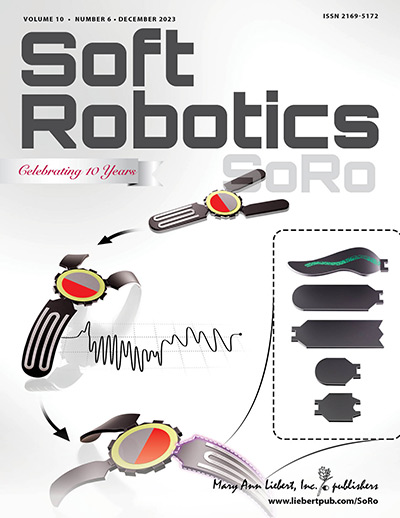YoMo: Yoshimura Continuum Manipulator for MR Environment.
IF 6.1
2区 计算机科学
Q1 ROBOTICS
引用次数: 0
Abstract
Origami robots have garnered attention due to their versatile deformation and potential applications, particularly for medical applications. In this article, we propose a Yoshimura continuum manipulator (YoMo) that can achieve accurate control of the tip position for the magnetic resonance (MR) environment. The YoMo made of a single piece of paper is cable-actuated to generate the bending and shortening deformation. The paper-based YoMo attached to an arc frame can readily function under different orientations in the MR environment. The design and fabrication of YoMo were formulated according to the Yoshimura folding pattern. The kinematics model based on constant curvature assumption was derived as a benchmark method to predict the tip position of the YoMo. The Koopman operator theory was applied to describe the relationship between the tip position and the length change under different orientations. The linear quadratic regulator integrated into the Koopman-based model (K-LQR) was adopted to achieve the trajectory tracking. Comprehensive experiments were carried out to examine the proposed YoMo, its modeling and control methods. The performance of the YoMo including stiffness and workspace was characterized via a customized test setup. The Koopman-based method demonstrates the superiority over the constant curvature-based model to predict the tip position. The K-LQR control method was examined with different trajectories, and the impact of the orientation, speed, and different trajectories were taken into consideration. The results demonstrate the YoMo is capable of achieving trajectory tracking with satisfied accuracy, indicating its potential for medical applications in the MR environment.YoMo:用于磁共振环境的吉村连续操纵器。
折纸机器人因其多变的变形和潜在的应用而备受关注,尤其是在医疗应用方面。在这篇文章中,我们提出了一种吉村连续机械手(YoMo),它能在磁共振(MR)环境中实现对尖端位置的精确控制。由单张纸制成的 "YoMo "通过电缆驱动产生弯曲和缩短变形。连接到弧形框架上的纸质 "尤莫 "可在磁共振环境中的不同方向上随时发挥作用。尤莫的设计和制造是根据吉村折叠模式制定的。基于恒定曲率假设推导出运动学模型,作为预测 "尤莫 "尖端位置的基准方法。库普曼算子理论被用于描述不同方向下尖端位置与长度变化之间的关系。在基于库普曼的模型中集成了线性二次调节器(K-LQR),以实现轨迹跟踪。对所提出的 YoMo 及其建模和控制方法进行了综合实验。通过定制的测试装置对 YoMo 的性能(包括刚度和工作空间)进行了表征。在预测尖端位置方面,基于 Koopman 的方法优于基于恒定曲率的模型。对不同轨迹的 K-LQR 控制方法进行了检验,并考虑了方向、速度和不同轨迹的影响。结果表明,YoMo 能够以令人满意的精度实现轨迹跟踪,显示了其在磁共振环境中的医疗应用潜力。
本文章由计算机程序翻译,如有差异,请以英文原文为准。
求助全文
约1分钟内获得全文
求助全文
来源期刊

Soft Robotics
ROBOTICS-
CiteScore
15.50
自引率
5.10%
发文量
128
期刊介绍:
Soft Robotics (SoRo) stands as a premier robotics journal, showcasing top-tier, peer-reviewed research on the forefront of soft and deformable robotics. Encompassing flexible electronics, materials science, computer science, and biomechanics, it pioneers breakthroughs in robotic technology capable of safe interaction with living systems and navigating complex environments, natural or human-made.
With a multidisciplinary approach, SoRo integrates advancements in biomedical engineering, biomechanics, mathematical modeling, biopolymer chemistry, computer science, and tissue engineering, offering comprehensive insights into constructing adaptable devices that can undergo significant changes in shape and size. This transformative technology finds critical applications in surgery, assistive healthcare devices, emergency search and rescue, space instrument repair, mine detection, and beyond.
 求助内容:
求助内容: 应助结果提醒方式:
应助结果提醒方式:


